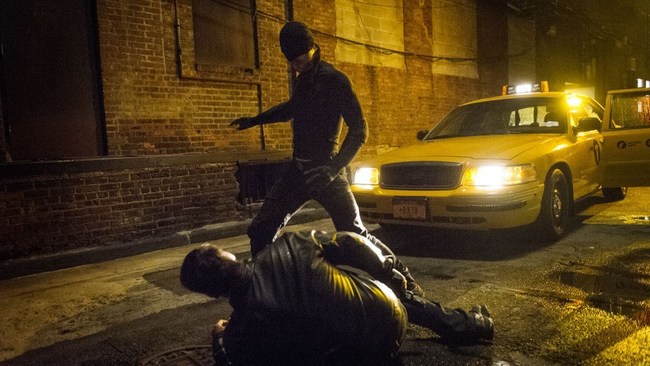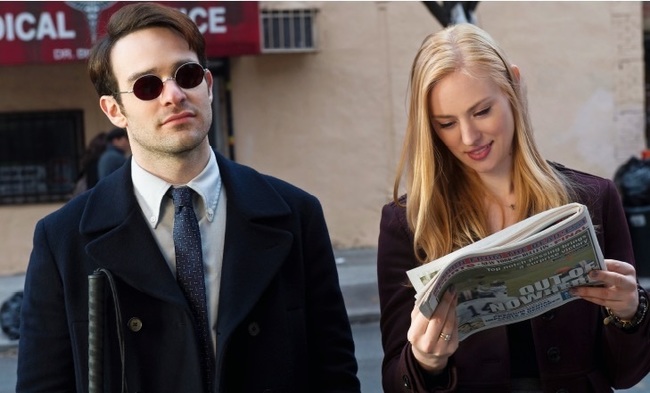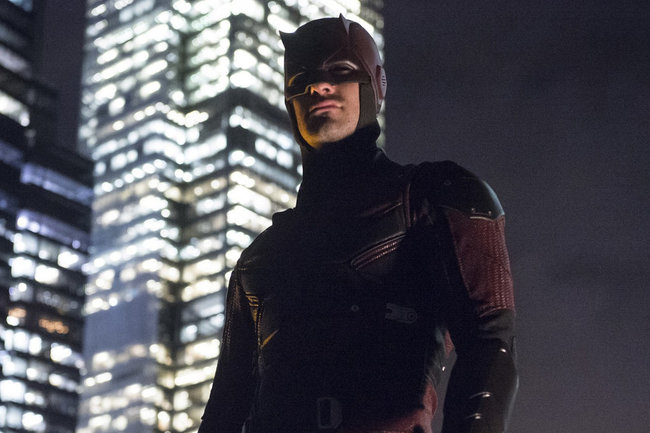Daredevil: Stretching the Marvel “Cinematic Universe”
- Spoiler Alert Please be advised that this article contains several references to major events and revelations from Season 1 of Marvel’s Daredevil.
The first of four announced Marvel Netflix series, Marvel’s Daredevil ambitiously revisits material first seen on the big screen in 2003’s unpopular Daredevil, directed by Mark Steven Johnson. A step up from the film in many ways, the series takes advantage of a slow narrative build, a better sense of the characters, and a more fleshed-out world in Hell’s Kitchen, all thanks in large part to its serial format. A longer total running time and the assumption that viewers will binge watch all 13 episodes allows Marvel’s Daredevil to take its time but also avoid reestablishing narrative content for new or lapsed viewers. Unfortunately, many of the film’s weaknesses - and a few new ones - remain.
Blinded as a child in a car accident, Matt Murdock’s (Charlie Cox) remaining senses are heightened, transformed by the chemicals that took his sight. A lawyer by day, he uses his radar “vision” to fight crime in New York’s Hell’s Kitchen by night. Taking on organized crime and the mysterious Wilson Fisk (Vincent D'Onofrio) behind it all, Matt must also face a corrupt system of police, lawyers, and judges on the take.
Matt’s law practice is shared with his partner Foggy Nelson (Elden Henson) and their secretary Karen Page (Deborah Ann Woll), herself a victim of Fisk’s corporate fraud and murderous corruption. Added to the mix are reporter Ben Urich (Vondie Curtis-Hall), working with Karen on an exposé of Fisk, and Claire Temple (Rosario Dawson), a nurse who, aware of Matt’s identity and believing in his mission, patches him up whenever he needs it - and he needs it a lot.
While the focus is on Matt and his cohort of good guys, Marvel’s Daredevil also dedicates a great deal of time to Fisk’s own affection for Hell’s Kitchen, his backstory, and his budding romance with art gallery owner Vanessa Marianna (Ayelet Zurer). An appropriate foil and villain to Matt’s masked vigilante, Fisk is also repeatedly presented as his counterpart, a man driven by a similar desire to raise his neighbourhood to new heights and help the little guy.
While tied into Marvel’s cinematic universe, Daredevil is much grittier than The Avengers and its ilk. The series signals a willingness to stray from the more PG-13 marvel fare we’ve seen so far (including that made for television in Agents of S.H.I.E.L.D.). With a narrative centred around organized crime and “street-level” heroics, Daredevil foregoes the kid gloves we’re used to and offers up broken bones, torture, and gory murders (by and large, inflicted by our would-be hero himself).
As we wait for more Netflix originals and the superhero “Civil War” in the upcoming Captain America sequel, it is perhaps reassuring to know that Marvel’s stories can veer into new directions, and its heroes can stray from their strictly righteous (and sometimes blandly moralistic) paths, breaking laws and blending in with their foes.
One of Marvel’s Daredevil‘s strongest assets comes in its supporting characters who carry much of the show. The friendship between Foggy and Karen is especially charming and allows them to work against Fisk in their own self-contained way, while the idealistic Urich, grouchy and past his prime, helps from the sidelines. Fisk also manages to be both mysterious and remarkably fleshed out, due in no small part to D'Onofrio’s acting chops. He manages to be both larger than life and deeply human, with an imposing presence and child-like vulnerability simultaneously on display.
But the show has faults. While the story is allowed to unfold over a comfortable running time, it suffers from some awkward pacing and an over-reliance, in its early episodes, on backstory. Flashbacks to Matt’s college days and his first meeting with Foggy are a great way to balance our hero’s dark and brooding persona with some levity and a genuine human relationship, but the series focuses too heavily on Matt’s father and their all-too short time together to establish a motive. It is a boring and outdated origin story of injustice robbing the young protagonist of his sole parent. In this case Jack Murdock (John Patrick Hayden), a working class boxer, is killed by mobsters pressuring him to throw a fight. It was one of the film’s great weaknesses and fares no better in the series.
The parallels between Matt and Fisk also weigh down the series. Where Matt’s backstory is boring and overwrought, the notion of Fisk as antihero is frankly perplexing. Fisk is a compelling character in many ways. His brutality is juxtaposed with the tenderness he demonstrates towards Vanessa, but the notion that he is selfless or even marginally interested in the well-being of Hell’s Kitchen and its inhabitants is difficult to swallow. His first crime, or the first he is complicit in in Episode 1, is the trafficking of young women. It would be difficult to redeem such a character, to suggest an end that might justify these rather horrendous means. But what is Fisk’s endgame exactly?
We learn quickly that Fisk does not enjoy working with other criminals. That he does, in fact, try to mitigate some of the harm that they inflict, but his nebulous alliances are forged, seemingly, for the sole purpose of redeveloping the neighbourhood. There is little nobility to be found anywhere here. Fisk pushes people out of their homes and goes as far as to have low-income tenants murdered for the sake of expediency. Not only is this a banal goal, but it is one that ignores the reality of 21st Century New York and gentrification.
One can maybe forgive Marvel for transposing the 1960s themes of Daredevil onto the present day. The series creators do cleverly work the plot of The Avengers into their storyline to suggest that there is a reason New York is unrecognizable to the contemporary viewer, though one may still wonder at the notion of white Irish Catholics in Manhattan as some kind of underclass in the 2000s.
What is most puzzling in all of this is Fisk’s need to resort to crime to build condos on the island. The working class is pressured out of neighbourhoods all the time. That is exactly what has already happened in Hell’s Kitchen. Why should we forgive or sympathize with a man who would extort, brutalize, murder, and enslave people to achieve such a mundane, capitalist, and unambitiously achievable goal? More nuanced and compelling motivations could have provided much needed tension between Matt and Fisk, but instead, their rivalry is rather straightforward.
Fisk, like the other secondary characters, is well-fleshed out, despite this. Strangely, it is Matt who doesn’t benefit from the serial format. He seems one-dimensional. His friendships, and even his sense of justice always feel a bit half-baked and dragged out. And it’s hard to root for someone who both has faith in the American Justice System and feels entitled to mete out his own personal justice.
Where does Matt’s authority come from? When he beats criminals who have themselves been terrorized by Fisk, why should we side with him? In one particularly disturbing scene, he brutalizes a man barely conscious enough to register what is being demanded of him. Kept complacent through drugs, he is a rather strange (and sad) target for Matt’s rage. Matt’s heroism looks suspiciously like self-righteous tyranny, where one man decides which victims are deserving and which are not; though perhaps this scratches the surface of some deeper problems within the genre, exposing the unchecked privilege of being a superhero.
There are many missed opportunities in Marvel’s Daredevil, but the series signals an evolution in Marvel’s output. Unfettered by traditional media constraints, the superhero monolith can tailor its properties to different markets on multiple platforms, still under one banner.
Hopefully Season 2 will bring us more of what worked - a New York City with corrupt cops is something worth exploring, as are the limits of the justice system and vigilante violence. With Matt having assumed the Daredevil mantle and costume in the season’s final episode, a more clearly outlined mission, and some new villains, may soon emerge.


